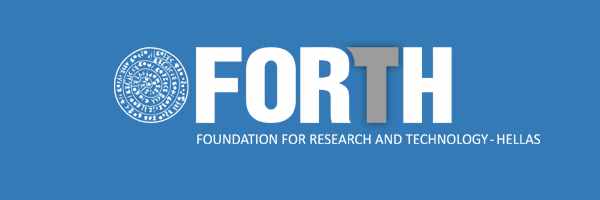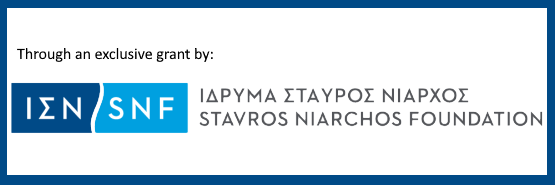Ref. 14675
Heraklion 18/09/2019
The Institute of Computer Science (ICS) of the Foundation for research and Technology Hellas (FORTH), in the framework of the project ARCHERS, aimed at reducing or even reversing the brain drain, which is funded by an exclusive donation of the Stavros Niarchos Foundation, is seeking to recruit one (1) Ph.D. candidate.
Job Description The Ph.D. candidate awarded this Stavros Niarchos Foundation – FORTH fellowship is expected to perform high quality research within one of the research areas, in which ICS-FORTH excels both on the national and the international level (www.ics.forth.gr).
Eligibility criteria
B.Sc. degree in Computer Science, Electrical and Computer Engineering, Informatics, or related areas
M.Sc. degree in Computer Science, Electrical and Computer Engineering, Informatics, or related areas
Previous experience in one or more of the following: Signal and image processing, Machine learning and deep neural networks, Computational techniques in remote sensing
Very good knowledge of Greek and English language
Desirable qualifications
Grade Point Average (G.P.A.) of the undergraduate studies (25%)
Grade Point Average (G.P.A.) of the M.Sc. studies (25%)
Publications high-impact peer-review journals and participation in national and international conferences (20%)
Quality of the proposed project (30%)
Location: ICS-FORTH, Heraklion Crete GREECE
Desired Start Date: 01/12/2019
Duration of appointment: 12 months (with possibility of extension according to the needs of the project).
Application Submission Interested candidates who meet the aforementioned requirements can submit their applications no later than 18/10/2019, 23:59 local time (Greece) via http://www.ics.forth.gr/jobs/en/ using the link “Apply for the position” under the announcement.
In order to be considered, the application must include:
Filled-in Application Form
Detailed curriculum vitae (CV) of the candidate
Statement of purpose with a proposed project in a specific sub-area of research and a relation to the appropriate scientific contact person (maximum 2 pages)
Copies of academic titles/transcripts
Language certificates
At least one reference letter
Any application received after the deadline will not be considered for selection
Contact information For information and questions regarding the application and selection procedure, candidates are asked to contact Mrs. Chrysoula Iliaki, Email: chrys@ics.forth.gr , Tel. +30-2810-391603 For information and questions about the advertised position the activity of the group or the Institute, please contact Prof. Panagiotis Tsakalides, (mtsakalid@ics.forth.gr).
Selection Announcement
The result of the selection will be announced on the website of ICS-FORTH. Candidates have the right to appeal the selection decision, by addressing their written objection to the ICS secretariat within five (5) days since the results announcement on the web. They also have the right to access (a) the files of the candidates as well as (b) the table of candidates’ scores (ranking of candidates results). All the above information related to the selection procedure will be available at the secretariat of ICS-FORTH in line with the Hellenic Data Protection Authority. Access to personal data of co-candidates shall be limited to personal data (and relevant data) and supporting documents which have been the basis of the evaluation of the candidates for the specific post(s). Prior to the announcement of the personal data and/or documents of the co-candidates to the applicant, FORTH will inform the data subjects in an appropriate way.
Handling of personal data
FORTH is compliant with all legal procedures for the processing of personal data as defined by the Regulation EU/2016/679 on the protection of natural persons with regard to the processing of personal data.
FORTH processes the personal data and relevant supporting documents that you have submitted to us. Processing of that data is carried out exclusively for the needs and purposes of this specific call. Such data shall not be transmitted to or communicated to any third party unless required by law.
FORTH retains the above data up to the announcement of the final results of the call, unless further process and reservation is required by law or for purposes of exercise, enforcement, prosecution of certain one’s legitimate legal rights’ as defined in the Regulation EU/2016/679 and/or in national law.
We inform you that under the Regulation EU/2016/679 you have the rights to be informed about your personal data, access to, rectification and erasure, restrictions of process and objection to as provided by applicable regulation and national laws.
We acknowledge also to you, that you have the right to file a complaint to the national Data Protection Authority. For any further information regarding exercise of your personal data protection rights, you may contact the Data Protection Officer at FORTH at dpo@admin.forth.gr.
You have the right to withdraw your application and consent for the processing of your personal data at any time. We inform you that, in this case, FORTH shall destroy such documents and/or supporting documents submitted and shall delete the related personal data.

